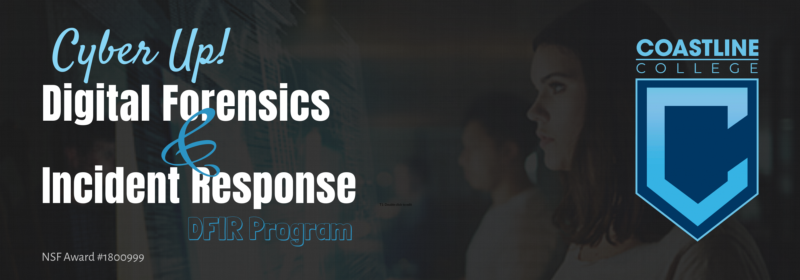The project will focus on the development of curriculum that will teach students and professionals the cybersecurity knowledge and skills of digital forensics and incident response, which need to be deployed in real-time and are dynamic to changing situations during and in response to cyberattacks. Through the DFIR program, the project intends to create adoptable educational resources; form academic, government, and industry partnerships; and prepare qualified cybersecurity technicians and professionals for entry into, or advancement within, the U.S. workforce.
Predominantly, cybersecurity education focuses on theory and skills to build secure programs, networks, and systems, but in the event of a cyberattack, when security is breached, theories and models are not enough. To increase national security for the U.S. and meet its workforce needs, cybersecurity education must develop new knowledge and skills. To address this need, the Cyber Up! Digital Forensics and Incident Response (DFIR) project at Coastline College will research, create, adapt, adopt, and implement a suite of course content that supports a Certificate of Achievement and an Associate of Science degree.
As a Center of Academic Excellence in Cyber Defense Education (CAE-CDE), the implementation of the DFIR program at Coastline College has the potential to be transformative, bringing about needed and important change to U.S. education and security. Thus, the program expects to increase the availability and readiness of qualified cybersecurity technicians in the U.S. workforce, resulting in greater global competitiveness for the U.S. economy and increased national security. A comprehensive project evaluation will measure the DFIR program's effectiveness, which will in turn support adaptation and replication by other institutions.
The National Science Foundation's Advanced Technological Education (ATE) program has been funding innovation at two-year colleges for over twenty years. With a focus on the education of technicians for the high-technology fields that drive our nation's economy, and strong partnerships between academic institutions and industry, ATE promotes improvement in the education of science and engineering technicians at the undergraduate and secondary school levels.
To learn more about ATE, please visit the NSF ATE program home page.
The Digital Forensics and Incident Response (DFIR) program distance education modalities will be designed for a national reach and assist in preparing students for successful employment. The project will work towards providing cybersecurity advancement through various modalities since the content, courses, certificate, and degree will all be available online. The project will also develop virtual labs and faculty resources.
The DFIR program will aim to reach educators, institutions, and diverse populations with important new knowledge and skills in digital forensics and incident response. Faculty development will provide educators new knowledge and enhance their abilities in these new technological and pedagogical skill-sets, leading to enriched educational structures at the institution. Because of the adoptable, modular content, other institutions can benefit through adoption into their programs, creating pathways to greater skills and knowledge for students and professionals.
Increasing skills and knowledge in diverse and underrepresented populations in cybersecurity will help to assure increased participation of women, minorities, and special populations in science, technology, engineering, and mathematics (STEM) education and in the STEM workforce. Thus, the program will strive to generate important new knowledge and skills to share with students, professionals, and the academic community.
Principal Investigator
Professor Tobi West, CISSP, GCFE
CIS/CST/DGA Department Chair
714-714-7244
12901 Euclid St
Garden Grove, CA 92840

According to CyberSeek, there are over 300,000 cybersecurity job openings at the national level. As more positions open, the cybersecurity talent gap continues to grow across the U.S. Through the Cyber Up! DFIR project, Coastline College is working to reduce the cybersecurity skills gap and develop talent for the cybersecurity workforce by providing programs that help students prepare for cybersecurity work roles through hands-on activities.
Coastline College received a three year award funded by the National Science Foundation as an Advanced Technological Education (ATE) project under grant award #1800999 called Cyber Up! Digital Forensics and Incident Response (DFIR) Program.
Funded by the National Science Foundation, the Advanced Technological Education (ATE) program emphasizes two-year Institutions of Higher Education to support curriculum development, professional development of college faculty and secondary school teachers, career pathways, and other activities related to the education of technicians for the high-technology fields.
The ATE program encourages proposals from Minority Serving Institutions that offer associate degrees, to support underrepresented students for success and completion in STEM education pathways. Coastline College is recognized as both a Hispanic Serving Institution and an Asian American Native American Pacific Islander Serving Institution (AANAPISI).
Following the ATE program solicitation guidelines, Coastline College’s Cyber Up! DFIR grant proposal identified broader impacts and intellectual merit to satisfy the merit review criteria for a “new to ATE” project award in the amount of $225,000. This award reflects National Science Foundation's statutory mission and has been deemed worthy of support through evaluation using the Foundation's intellectual merit and broader impacts review criteria.